Strategic Forum: Alan Joyce tells of routes taking Qantas back to the skies
Alan Joyce says demand for reopened Sydney-Melbourne corridor is ‘unbelievable’ as the airline experiments with routes it has never operated before.
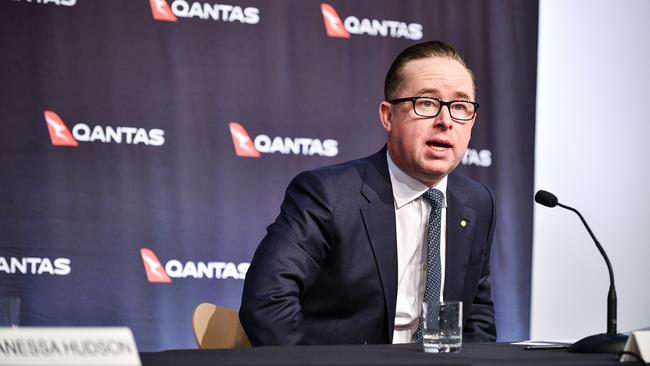
- Returning expats a brain gain
- Return to migration to boost recovery
- Hobson: Vaccine raises healthcare questions
- Liveris: How Covid shows way forward
We hope you enjoyed The Australian’s Strategic Forum, in partnership with BHP. If you are a subscriber and missed any of the Strategic Forum program, all keynotes, panels and in conversations are now available to stream on demand by clicking here and using the access code: SF_2020!
Meanwhile, highlights from today include:
Alan Joyce says demand for reopened Sydney-Melbourne corridor is ‘unbelievable’ as Qantas experiments with routes it has never operated before.
Salesforce Australia chief executive Pip Marlow said expats returning to Australia were a boost for the nation.
The Dow Chemical Company former chairman and chief executive Andrew Liveris says COVID has exposed social and political tensions and shed light on possible solutions.
The program has now concluded.
Damon Kitney 11.50am: New routes taking Qantas back to the skies
Qantas chief executive and managing director Alan Joyce says there has been ‘unbelievable’ demand for a reopened Sydney-Melbourne air corridor, as the airline experiences good results from routes it has never operated before the pandemic.
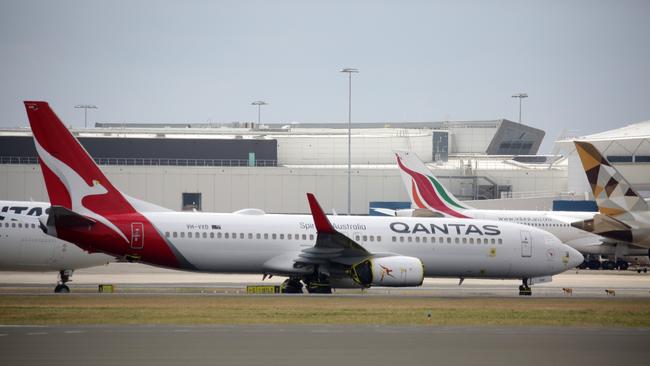
Qantas will next week resume 15 flights a day between Sydney and Melbourne, still well below the 45 flights a day operating before COVID hit.
But Mr Joyce said bookings on the route and a current sale by Qantas’s budget carrier Jetstar showed people were willing to travel when borders were open.
“Within days of that (Sydney-Melbourne) announcement we had 40,000 people book on those flights. Jetstar has just launched a sale with a return trip for free. Within in an hour it sold 13,000 seats. Within a day they have sold over 100,000 seats. That is unbelievable because this is for travel post February and usually Jetstar’s sales would be at 2000, not 100,000 (per day). The biggest travel is out of Melbourne. So there is huge demand,’’ he said.
“We are trying a lot of new routes that are working. For example Canberra to Cairns, Hobart to Perth, and we are seeing demand on routes we would never have operated before actually appearing because people can do that. So you will see Qantas doing a lot of this.”
The airline is hoping to be back to 60 per cent of its pre-COVID schedule by Christmas.
“We hope if the virus is kept under control and the borders are kept open, we will be back in the first quarter of the calendar year to 80, 90 and then 100 per cent of our schedule.
Jobkeeper runs off in March so we really need to get this going before that happens,” Mr Joyce said.
The Business Council estimates that Australia is losing $319 million a day because of closed borders.
READ MORE: Don’t regulate away recovery, pleads Qantas chief Joyce
Adeshola Ore 11.15am: Border closures pure politics: Flight Centre chief
Flight Centre chief executive Graham Turner says Australia’s border closures have been “pure politics.”
“Australia as a whole should be run as one country and the rules should be the same everywhere,” he said.
“Even the domestic market would make a huge difference to the tourism sector.”
“Whenever borders tighten up, it has a huge impact straight away. When NSW opened up to South Australia a few weeks ago, there were tens of thousands of bookings done.”
Tourism Australia managing director Phillipa Harrison said reactions to hotspot damaged consumer confidence.
“The industry is reporting back that they’ve had mass cancellations and we have a consumer who doesn’t want to travel outside of their state because they don’t want to take a chance on that,” she said.
She called for Australia to adopt a consistent approach to tackle coronavirus flare ups.
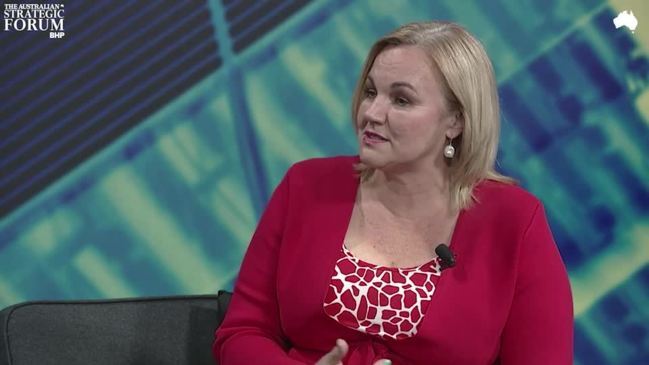
The Australian Museum chief executive Kim McKay said the institution was planning to reopen next week with half the number of visitors compared to prior to the pandemic.
“By pulling some leavers we may be able to see an uptick from domestic travellers,” she said.
“We’re seeing an incredible response online for bookings for our future exhibitions.”
But she said the museum was reliant on interstate travellers.
Mr Turner said he expected international travel to return to Australia in about six months.
“It would appear that the vaccines will be reasonably spread around by mid-year and I think international travel will come back fairly rapidly after that with the condition you have to be vaccinated with one of the approved vaccines.”
Business travel would lag behind leisure travel, he said. While pent-up demand for leisure travel could result in a return to pre-coronavirus levels in one year.
“I think airfares within a year will come back to good value, but in the short term they could be a little bit more expensive,” he said.
The final panel of the day is titled Rebuilding Our Tourism and Arts sectors post COVID-19. Promoting Australia to the world
Hosted by The Australian’s Associate Editor Helen Trinca, it will feature:
The Australian Museum chief executive Kim McKay
Flight Centre chief executive Graham Turner
Tourism Australia managing director Phillipa Harrison
Adeshola Ore 10.50am: Investing in China
The next panel is titled Investing in China, how to take advantage of business opportunities at this time of heightened trade tensions and security concerns
Hosted by The Australian’s former China correspondent Glenda Korporaal, it will feature:
Will Glasgow, China correspondent, The Australian
Cheryl Kalisch-Gordon, Senior Analyst, Rabobank
Chris Carr, Partner and Chief Representative, Shanghai, MinterEllison
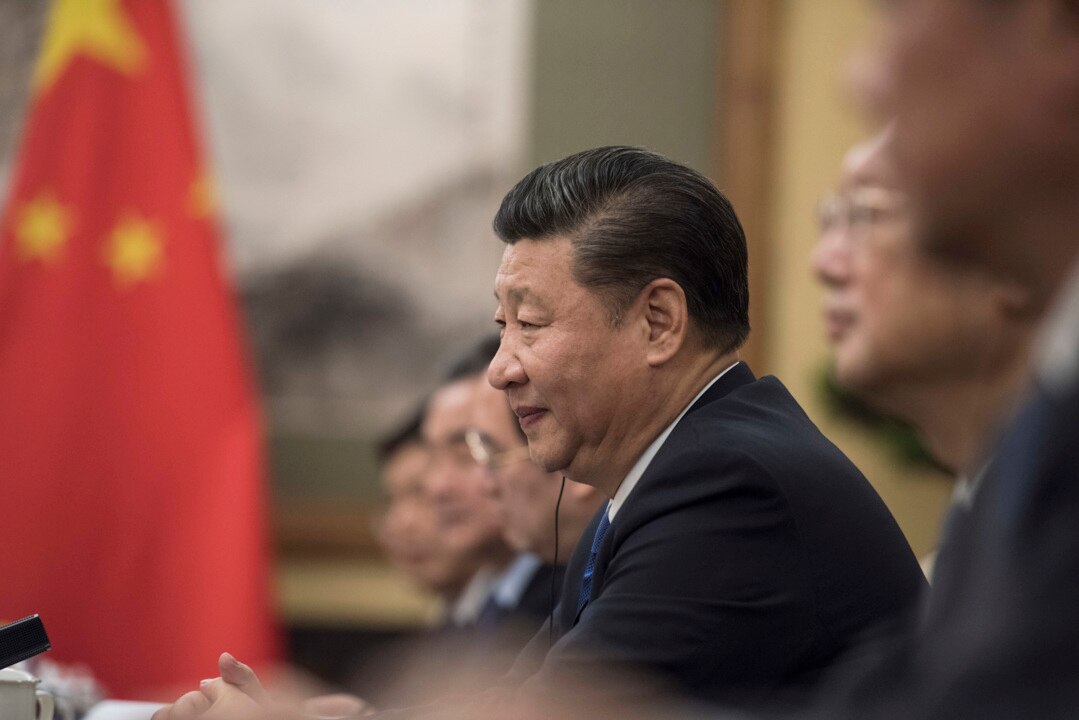
Mr Carr said Australia and China’s business to business relationships were strong, despite diplomatic tensions.
“China will remain a key actor in the story of our time,” he said.
“There is government to government relationships. but we also have business to business which is operating very strongly and people to people relationships.” .
“We cannot abandon China, we need to find better ways to relate to China.”
Ms Kalisch-Gordon said Australian agriculture would be able to survive the trade spat due to global factors.
“In the meat complex, African swine fever has created a void for animal proteins which is good for our exports in relation to China,” she said.
“It’s not plan A, it’s not good, and we do need to work on it.”
Glasgow said Australia’s exports to China revealed the dependency of the two countries.
“It is still amazing that Australia by the end of October had already recorded the highest value of exports into China,” he said.
Ms Kalisch-Gordon said Australia had opportunities to diversify across Asia and Europe.
“When we look more broadly at the globe, we have to remember that China is not Asia,” she said.
“If we look at south-east Asia we’re looking at 35-50 million middle class consumers in the next decade. It offers a huge opportunity.”
“If we look at the EU, that is a context that is paying for much more than just the product.”
Mr Carr said all Australian businesses should be constantly evolving their China strategy.
“it’s not a one-off strategy,” he said.
“You need to be constantly looking at your strategy there. Once you’ve got a degree of success, you have to look at diversification. But it’s not diversification away, it’s China plus.”
READ MORE: PVO — China doesn’t like our Japan deal? Bad luck
Adeshola Ore 10.15am: Brain drain vs brain gain
Salesforce Australia chief executive Pip Marlow said expats returning to Australia were a boost for the nation.
“Right now skills sovereignty will be a lot more important. We’re seeing a lot of Aussies coming back and we’re getting that brain gain to get new ideas of looking at the world,” she told a panel discussion hosted by Ticky Fullerton.
“One in four Australians are born overseas, it’s been a big part of our population growth. Right now skills sovereignty will become far more important and what I’m seeing is a lot of Aussies boomeranging back so we are getting a brain gain versus a brain drain that we’ve seen over the past few decades. So let’s bring them back.”
But Committee for Economic Development of Australia chair Diane Smith-Gander said the constraints of immigration remained a challenge.
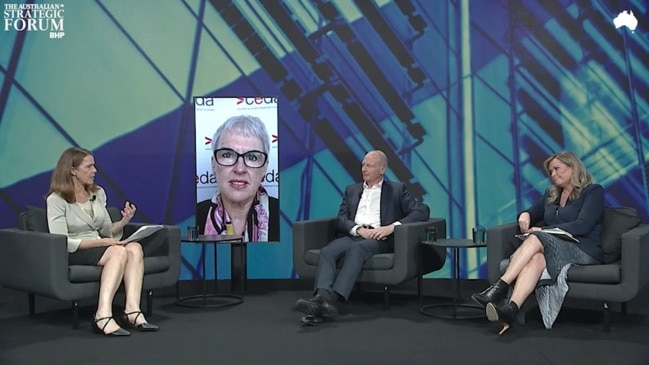
“It’s important for us to get tertiary students coming back because so much of our economy comes from this trade flow,” she said.
“I think our China relationship will be much better when we can visit each other again.”
Cochlear chief executive Dig Howitt added that Australia had become a more desirable place to live due to the low coronavirus numbers.
Mr Howitt welcomed the federal government’s deal with pharmaceutical giant CSL.
“That they’re building a manufacturing plant here is fantastic. It will create jobs and real expertise in medical products which is critical for Australia’s future.” he said.
“We have to make sure we have an economy which is internationally competitive.”
He said Australia was brilliant at creating ideas, but struggled to commercialise and export them.
“The change to the R&D tax incentive was an important step and the announcement in the budget to focus on six industries, of which healthcare is one. But we need to go further and our tax rate is uncompetitive.”
“Companies absolutely look at tax rates when they look at where to invest. We’re seeing around the world more and more companies bring in a lower tax rate for intellectual property.”
READ MORE: Sheridan — As we reopen, migrants must top our agenda
Adeshola Ore 9.45am: Measured return to migration to boost recovery
Commonwealth Bank chairman Catherine Livingstone says a Biden administration would offer Australia more predictability and structure.
“Biden has said in the past he’s someone who looks for common ground and a middle ground, which will be useful when we’re looking at trade,” she told a panel discussion
hosted by The Australian’s Senior Banking Reporter Joyce Moullakis featuring herself and NAB chairman Philip Chronican.
“There have been some very positive signals in terms of initial moves to reset the way the US works with the rest of the world.”
NAB chairman Philip Chronican said it was important to temper expectations for a Biden administration.
“If we go back to 2017, both sides were against the Trans-Pacific Partnership. But there are some signs with Paris and the WHO where we will see the Biden administration take a different approach.”
“I think what we should expect is a more communicative approach so the allies will be more involved.”
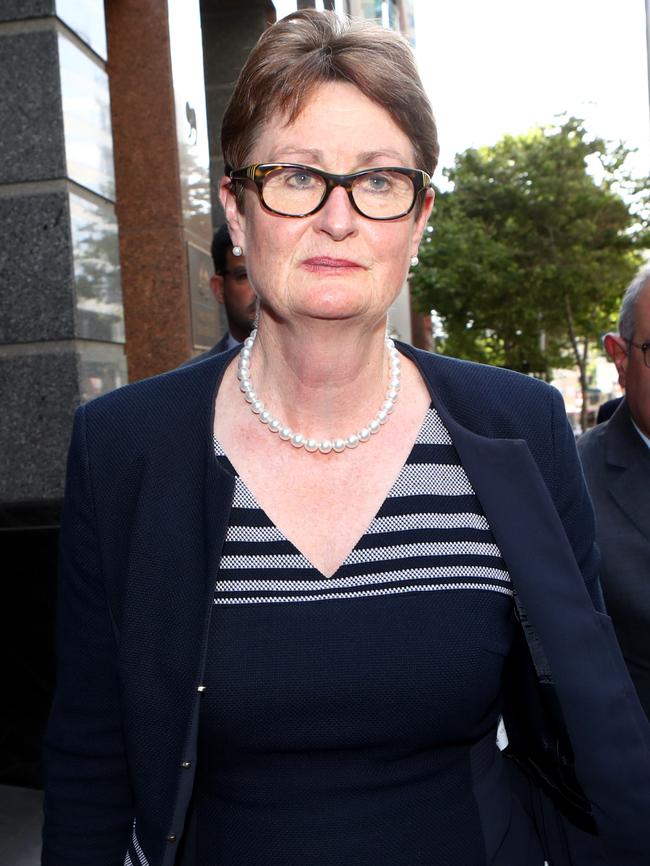

Mr Chronican called for a measured return to migration to boost Australia’s economic recovery.
Ms Livingstone said it was important to not be simplistic when considering immigration and weigh up the necessary skills with the level of infrastructure investment needed.
“When you look at Australia’s rate of immigration, we have the highest in the OECD other than Luxembourg,” she said.
“So we do have to recognise the impact on a very high rate of immigration on an existing base and what that means for managing that and the investments you have to make and also the skills you’re bringing in.”
“Immigration delivers growth if you have the skills and the people coming who are keen to build a life or a business in the country.”
Ms Livingstone said Australia recently had over 400,000 expats return during the pandemic.
“That’s a massive injection of people and skills so I don’t think we should underestimate the impact of that.”
READ MORE: Policy consistency, skills growth to boost business
Adeshola Ore 9.30am: Covid vaccine raises questions about healthcare
The second session of the day features Ariel Investments co-chief executive and president Mellody Hobson. Ms Hosbon is also the Vice-Chair of Starbucks.
Ms Hobson says the vaccine debate has raised the question of access in the healthcare sector.
“The vaccine is an example of where you need healthcare to work for the whole world, not just the wealthiest parts of the world,” she said in conversation with The Australian’s Associate Editor Glenda Korporaal.
She predicted continued innovation, improved access, which would be a boost for healthcare businesses.
She said her firm, Ariel Investments’s approach was non-consensus investing.
“We’ve leaned into the volatility and taken advantage of the bargains that are out there.. our goal is to buy companies that other people have overlooked,” she said.
She said the company had invested in travel and leisure companies, despite the deep freeze on the sector.
Ms Hobson said the energy sector had been difficult for her firm to invest in, particularly during the pandemic.
“We put a toe in the water with our international investment portfolio, but found ourselves being there a little too early,” she said.
But she said US investors were beginning to gain awareness of environmental and social governance
“Australia really led the way on ESG investing and putting criterias to place for asset managers in superannuation funds. Europe has been ahead of America as well,” she said.
Adeshola Ore 9.20am: Leverage manufacturing for post-Covid future
The Dow Chemical Company former chairman and chief executive Andrew Liveris says COVID has exposed social and political tensions and shed light on possible solutions.
He said it had revealed the global failing social contract, the drive for ESG in business and the geopolitical tensions with China.
“Bringing about a more inclusive social contract will be the main challenge of the next 15 years,” he told the forum.

He called for silos in society to be broken down, through the private sector creating social and environmental change.
“Purpose based enterprises are setting a new benchmark,” he said.
He noted that Australia lagged behind in the global trend of employing people from the private sector in government.
“Many people in the public sector do not understand business. Equally, many people in business do not help shape policy outcomes and debate.”
Mr Liveris called for Australia to leverage its manufacturing sector, which featured as a cornerstone in the federal government’s October budget.
“It’s a capability that translates Australia’s brilliant innovation engine into high quality products, jobs and values,” he said.
“Rigorously focused inventions in a handful of industries, where we indeed have a competitive advantage that can have a world scale impact, is at the heart of that ambition.”
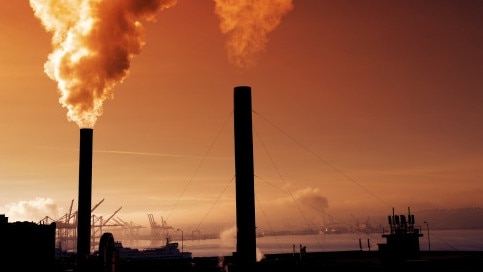
Turning to sustainability, Mr Liveris said Australia must prosecute the global environmental and social governance agenda.
“It requires our corporate leaders to lean into these opportunities. The climate change debate is no longer the great debate topic,” he said.
“Affordable, risk management policies and strategies are required to reach the net zero by 2050 goal. That is the absolute minimum target for all of us on this fragile planet.”
“This is not coal versus renewable, this is not fossil fuels versus green energy, this is an all of the above energy emissions policy that includes a risk managed and affordable transition.”
He called for Australia to deepen its relationship with the US and triple the country’s investment in Australia.
On China, he said the country’s acceleration should be expected over the next 10-15 years.
“China has realised it needs to exert its own power and it has a lot to exert,” he said.
Mr Liveris said China would remain a big consumer of Australian goods, highlighting the value of the relationship.
“I suggest we listen very closely to China’s needs and deliver Australian solutions... we need to be proactive and engage in what is becoming the China century,” he said.
READ MORE: Editorial — Tokyo visit emphasises strength of strategic ties
Rosie Lewis 8.00am: US-China deals ‘must not erode our interests’
Trade Minister Simon Birmingham has urged the incoming Biden administration to ensure any new trade deals struck with China do not undermine the interests of Australia or other US partners and is hopeful the president-elect will inject more consistency into foreign policy.
Addressing The Australian’s Strategic Forum, Senator Birmingham also said the challenge for Joe Biden would be to build consensus on reforming multilateral institutions like the World Trade Organisation and not simply identifying problems, as Donald Trump had done.
The WTO’s appeals process has been in a deadlock in recent years after Mr Trump refused to approve replacement judges to its appellate body but there is a push from Australia and others for the US to be part of a WTO reform process already under way.
“A Biden administration, they are to tackle those grievances the Trump administration has rightly identified. It needs to also be about building support for those grievances and even more importantly building support for the solutions to those grievances,” Senator Birmingham said.
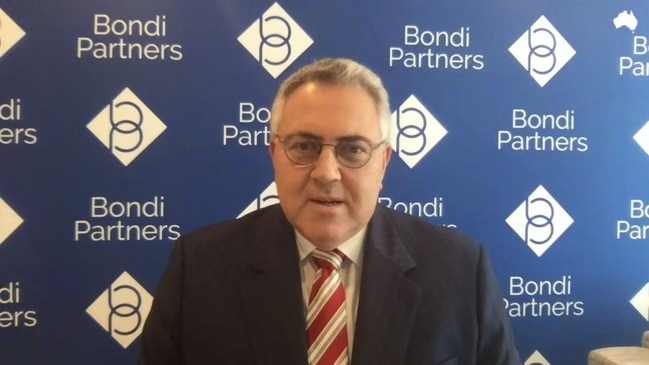
“That’s where US leadership and their administration can perhaps make the most tangible difference in successfully extending and building alliances that will get results in terms of improving and fixing those challenges in multilateral institutions like the WTO, not simply highlighting the problems and leading a circumstance that potentially degrades over time.”
While Senator Birmingham did not expect to see a “dramatic change” in US trade posture or in the types of tariffs imposed on America and China by each other, he hoped there might be more consistency and predictability from a Biden administration on trade and foreign policy.
READ the full story here
Glenda Korporaal 7.50am: China relations to get worse before they get better
You can’t blame the Morrison government for wanting to put the best spin on the potential for a new trade deal, the Regional Comprehensive Economic Partnership, to provide a possible circuit-breaker in ties with China.
But despite signing the RCEP deal at the weekend with 14 countries including China, and a passing comment by Josh Frydenberg at The Australian’s Strategic Forum on Wednesday that the government was keen to re-engage in a “respectful and beneficial” dialogue with China, relations with China, including critical trade relations, are set to get worse before they get better.
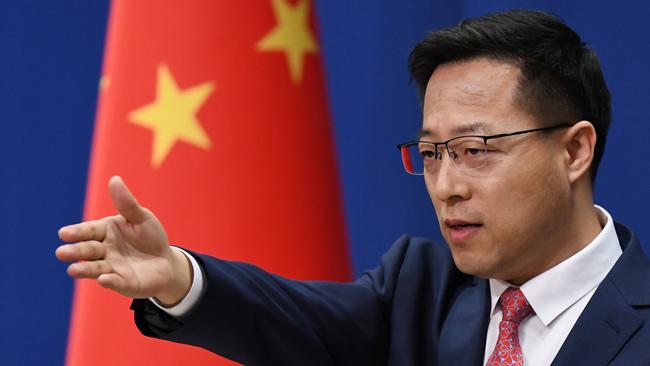
The government has worked hard to present a public face that it can maintain its current policies and comments about China while the Australian economy can still enjoy the benefits of robust trade with the world’s second-largest and fastest-growing economy.
READ Glenda Korporaal’s full commentary here
Cameron Stewart 7.40am: ‘Biden to hang tough on Beijing’
Australia will seek to work more closely with the new Biden administration on China to encourage Beijing to modify its behaviour in the region, Australia’s Ambassador to the United States Arthur Sinodinos says.
Mr Sinodinos also said he expected Joe Biden would maintain the Trump administration’s tough approach to China but would do so more in concert with regional allies like Australia.
“We’ve encouraged a Trump administration and we will encourage a Biden administration to work closely with us and others because I think for us it is important that China is brought into the rules based order in a way which is consistent with that order working to the benefit of everybody,’ Mr Sinodinos told The Australian.
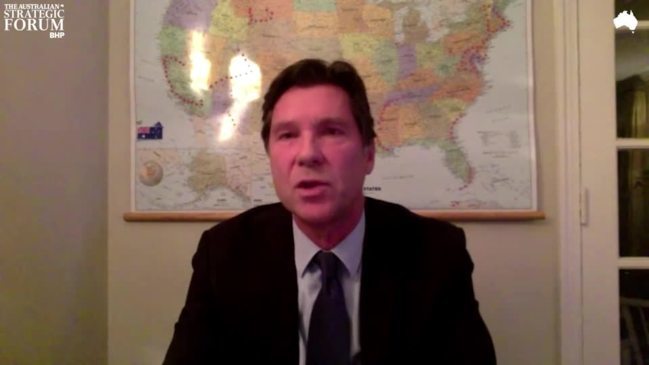
“We want a strong and prosperous China but it has to work within that context. And that works best when we and other countries work together to convince them that the calculus of benefit for them is to be part of that rules based order.”
READ the full story here
David Swan 7.30am: Election meddlers kept at bay
The US learned important lessons from its compromised 2016 election and managed to successfully ward off cyber interference this time around, The Australian’s Strategic Forum has heard.
Speaking on Wednesday at the forum, the Australian Strategic Policy Institute’s Tom Uren said a new policy of transparency from the government helped thwart any would-be malicious hackers or nation states from disrupting the 2020 electoral process.
“The US government was a lot more transparent from the get go,” he said.
“In the last election, there were a lot of operations that went on that were never transparently discussed until after the election. The Obama administration knew things were happening, but they were in two minds as to whether they should say anything. Clearly this time, they’ve decided if we discover something, we’ll immediately talk about it, and that took the heat out of it.’’
READ the full story here
Adam Creighton 7.20am: Get cracking on the list, RBA warns
Reserve Bank governor Philip Lowe has urged the Morrison government to move faster to reform the economy, singling out an industrial relations system that “needs fixing” and lamenting a lack of “big-signature moves” to boost productivity.
Speaking at The Australian’s Strategic Forum on Wednesday, Dr Lowe said state and federal governments were still looking at the recommendations of the Productivity Commission’s Shifting the Dial Report, “which had identified a lot of opportunities to improve the delivery of government services”.
That report was sent to the government in August 2017.
READ the full story here
Will Glasgow 7.10am: China to Frydenberg: You created problem, you fix it
China has responded to Josh Frydenberg’s olive branch with a list of grievances and threats, describing the relationship as one with “serious difficulties”.
Chinese Foreign Ministry spokesman Zhao Lijian told a daily briefing that the Australian government knew what the issues were between the countries.
“Those who created problems shall be the one responsible to solve the problems,” Mr Zhao said on Wednesday in Beijing.
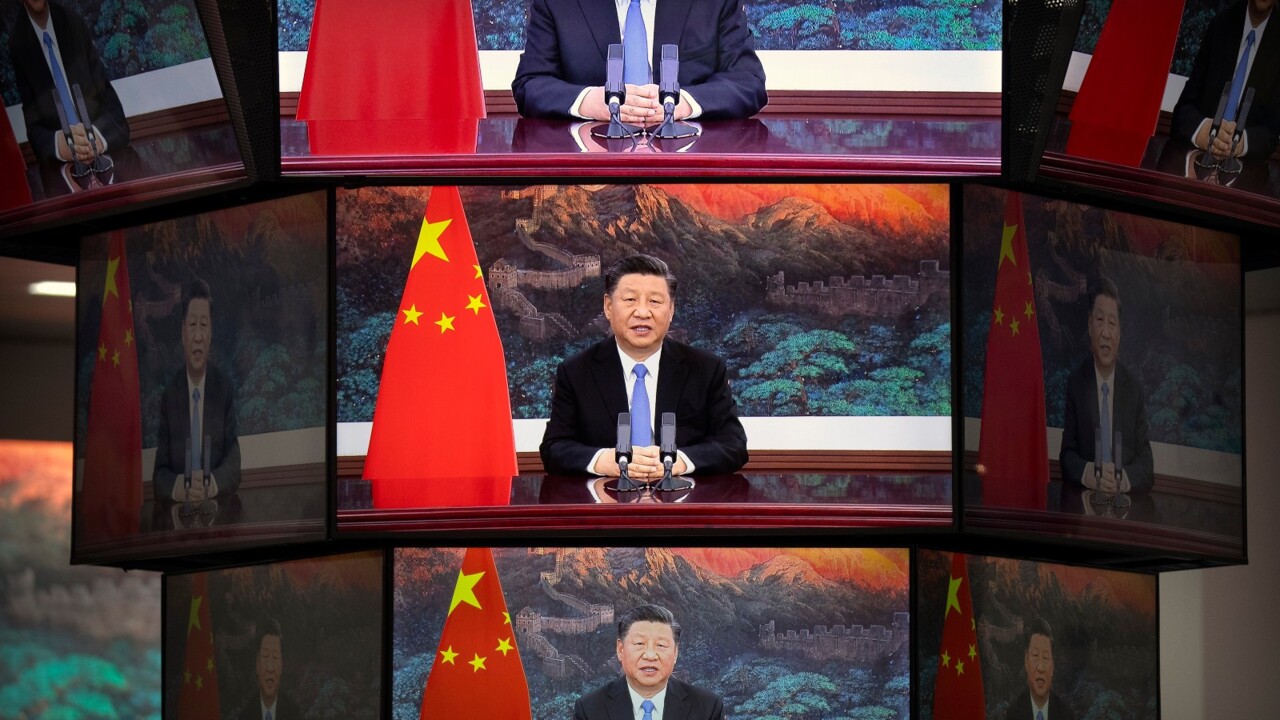
Those comments — and the list of grievances — came after the Treasurer told The Australian’s Strategic Forum that the government was ready to re-engage in “respectful and beneficial” dialogue with Beijing amid escalating trade pressure.
Mr Frydenberg’s speech, designed to reassure nervous business leaders that Canberra was open to rebuilding relationships with Chinese leaders, came as Scott Morrison signed a historic “in principle” defence agreement with Japan.
In separate comments to Nine News on Wednesday, the Chinese embassy in Canberra said: “China is angry. If you make China the enemy, China will be the enemy.”
READ the full story here



To join the conversation, please log in. Don't have an account? Register
Join the conversation, you are commenting as Logout